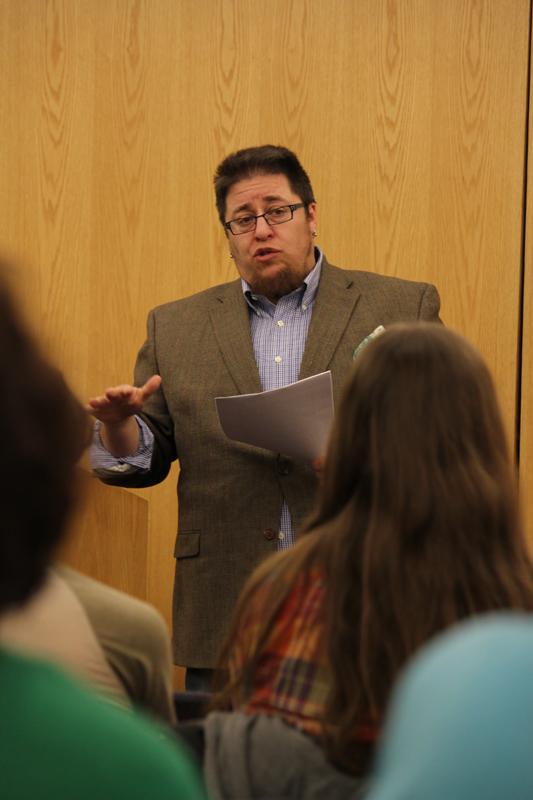A storytelling performance at Northwestern’s Fiedler Hillel on Monday night emphasized the importance of family and Jewish tradition in determining one’s gender and religious identities.
S. Bear Bergman, a storyteller who has written several books for both children and adults, performed “Machatunim,” a suite of four stories about his nontraditional family and the problems confronting the lesbian, gay, bisexual, transgender and queer communities. A number of NU departments and student groups collaborated to host the event, including the Crown Family Center for Jewish and Israel Studies and the LGBTQ Resource Center. About 30 people attended the event.
“It was a great opportunity for me to learn more about the wider-gendered world,” said Eva Hare (McCormick ’07), who attended the event with the Chicagoland Gender Outlaws. “It’s a realization that, ‘Oh, there are other people who are similar to me, in that they’re similar because they’re different.”
Three of Bergman’s stories centered on the importance of his family and Jewish tradition in his life. Bergman said he adores his family because of the diversity of “genders, tattoos, races and backgrounds” represented there, but added that this diversity makes describing relationships tricky. He said the title of his suite, “Machatunim,” means “co-in-laws” and describes people who are family to him regardless of whether or not they are blood relatives.
“It helps to have a word for it when people ask if you’re family and their view is a bit more conservative than yours,” he said.
Bergman and his husband are practicing Jews who are raising their son, Stanley, in the traditional Jewish faith, emphasizing the importance of religion, tradition and family. They host traditional Shabbat dinners most Friday nights and attend religious gatherings.
Emphasizing the importance of not only family communities but also his network of co-in-laws, Bergman said he and his husband rely on on both in raising Stanley.
“The more non-related adults a child has in his life who are caring for the child’s well-being, the better off the child is,” he said.
The couple also encourages Stanley to explore different genders and gender roles.
Event organizers, including Hillel Rabbi Danya Ruttenberg, invited Bergman to speak because they said they thought his stories would fit well with the themes and ideas of the Jewish Queers, including queer issues, Judaism and family.
“The underlying theme here was about the way we think of family and the kind of ties that bind us, even if they aren’t conventional,” Ruttenberg said. “(Bergman) brings a queer eye to Jewish life and a Jewish eye to queer life.”
Ruttenberg added that Bergman’s stories about his identity provided an “important and vital voice for Jewish culture in terms of understanding what our culture is and what it can be.”
With his last story, Bergman reflected on the difficulties facing transsexuals in his performance of “Gathering Light Out of Darkness.” The story draws on Jewish folklore and the traditional lighting of candles at Hanukkah to emphasize light and uniqueness as a form of resistance to violence.
“It’s easier for people who are queer and trans to come out in Judaism because there’s so much more room for argument than in other traditions,” he said.



















